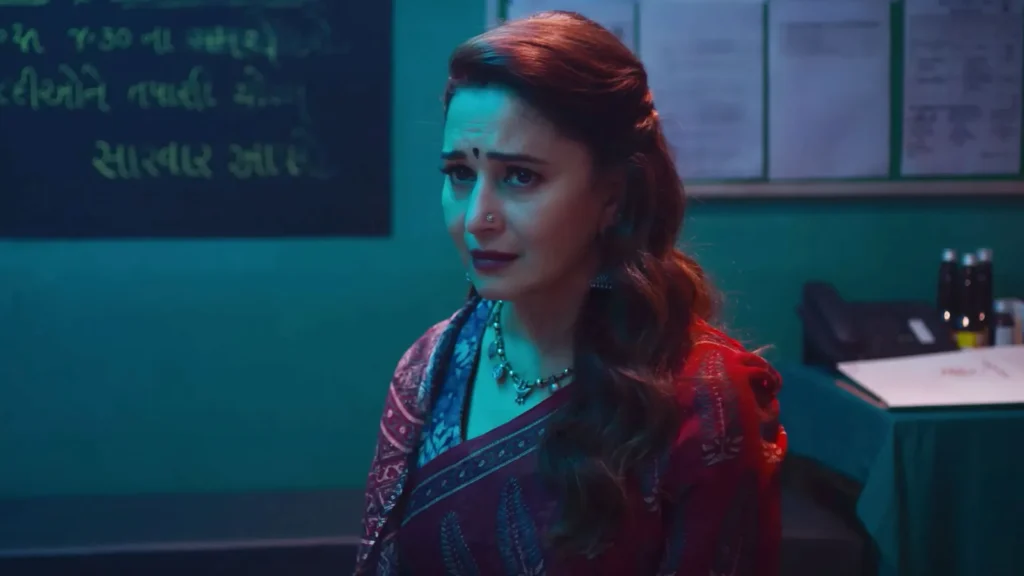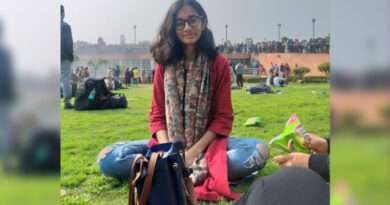Maja Ma- A Review
Maja Ma had a great storyline in the making. Unlike the popular media presence of young queer folks, here is an older woman trapped in a long-term heterosexual marriage, trying to come to terms with her sexuality. The seed of thought is promising, but the tree bore neither fruits nor flowers. The writing, character development, and story disappoint you further because the movie had great scope if made well. It could have opened up conversations in regular households about sexuality and concepts of family. It could have revolutionized acceptance and acknowledgment for old folks in conventional family settings. But the movie fails in all the terms.
Pallavi, played by Madhuri Dixit, is the protagonist of the movie who is trying to cope with the heterosexual marriage despite being a lesbian. She tries to be a good wife and a mother by tending to all her familial and social duties well. Her neighbours love her for being generous and loving until a video that hints at her sexual orientation leaks. Suddenly, people are distant, relatives are cold, her son is offended, and her husband is taken aback. Pallavi’s married daughter Tara being a gender studies researcher is conveniently added to amp up the story but fails when she compares being closeted to one’s weakness. Pallavi finds it difficult to navigate between her homophobic son and a ‘progressive’ daughter who wants to save her. To add on to her misery, the non-resident Indians of the Patel family (her son’s potential in-laws) are adamant about preserving traditional Indian values and hence feel embarrassed about Pallavi’s sexuality. They harass her to take a lie-detecting test to clarify the rumour. Pallavi loses her voice, her agency, her autonomy regarding her sexuality, and her independent way of living.

A still from the movie Maja Ma (Source: GQ India )
The conversations of Maja Ma are as pretentious as the American accent of the Patels in the movie. The portrayal of queerness in the movie is sanitized not to offend the patriarchal society and appropriated to appease the “Indian culture”. Her son’s humiliating attitude reflects the higher standards expected from a mother as opposed to a woman without children. His hurtful words and gestures are justified in the name of love and worship toward mothers. The movie gives a lot of misleading messages about embracing one’s sexuality. An individual has the freedom to decide if and when they want to come out, whom they want to talk to, and how they want to navigate their sexuality based on their reality. Here, Pallavi is deprived of agency in her life while the movie gives wrong messages about women’s empowerment.
Pallavi has an apologetic tone lingering on her face throughout the movie. This translates to verbal apologies in many instances throughout the movie. Tara, with her heterosexual privilege, does not see the harm she does to her mother by confronting her in front of everyone. Here the ally’s struggles are amplified more than the queer individual’s. Pallavi is reduced to the status of a victim where people try to save her from shame and pain. With versions of offline and online conversion therapy on display and glorifying the family for accommodating a queer individual, Maja Ma collapses as a serious joke. None of the conversations about queerness is by Pallavi, she never gets a chance to tell her own story. This is the replica of social reality where one’s story is appropriated by the people and the patriarchal institutions around to fit into a normative narrative. It’s disheartening to see how it all comes back to protecting the heteronormative structure by keeping its pillars in place.



